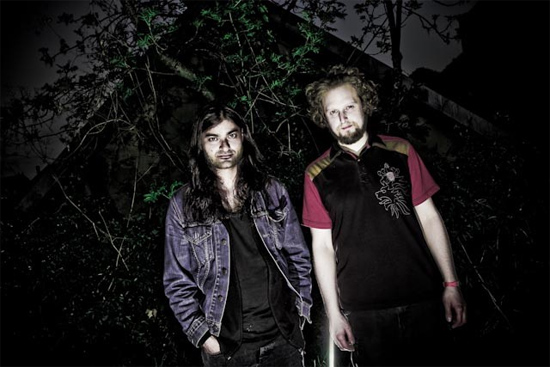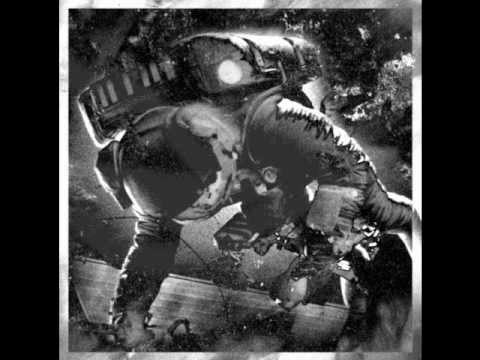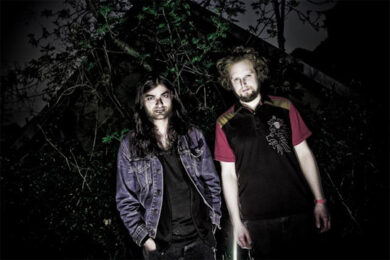Dwelling within the fittingly polluted surroundings of London’s eternally grey haze, AJ Cookson and Matthew Rozeik (aka Necro Deathmort) have only been conjuring up their funereal amalgamation of abrasive industrial beats and lurching drone for a mere five years now, yet over the course of three records, their music has endured more warped mutation than many bands could muster in an entire decade. With the ability to veer seamlessly between dub-infused electronica, pounding sludge and experimental noise – often within the space of just one song – their music is as intriguingly fresh as it is furiously grim. A bit like walking through an unlit labyrinth with no actual exit: claustrophobically hellish, yet you’re constantly on edge to see where the next turn will take you. The Quietus caught up with the duo via email to discuss their upcoming record The Colonial Script, their unwaveringly melancholic sound, and slightly offensive prog rock stereotypes.
Assuming the title of your new record The Colonial Script is a nod to ‘colonial scrip’ (a form of currency used by settlers in colonies before the American war of independence), can you tell us what influenced you to go with such a title and what relevance it has to the record itself?
Necro Deathmort: My friend Will actually introduced me to the phrase after I told him about the various lyrical themes on the album and it fitted perfectly. Lyrically, we had the idea of mapping the history of a terraformed planet and the fate of its settlers.
There seems to have been a definite musical progression over the course of your three records. The Colonial Script sounds a lot harsher and sludgier in nature than your last two releases. Was this pre-determined or did it happen organically?
ND: We knew we were going to make a heavier and darker record this time, but we didn’t really know how it would end up sounding. We spent a lot less time agonising over detail than with the last record and tried to just smash it out within a few months.
Does the album artwork depicting a lone space marine have any direct link to the album’s title or lyrical themes? All I can picture is something akin to the great depression happening in space amidst a civil war. Am I way off here?
ND: It’s a pretty literal depiction of the opening track on the album, though it’s not set in a time of war. It’s supposed to be how the early settlers on the planet may have looked from space. It parallels how the frontier settlers may have seemed to the Native Americans at the time.
How have you found the process of transferring the mechanical intensity of the new material from the studio into a live environment? What is your current live setup?
ND: Our sound changed once we started doing live shows, so it’s a pretty straightforward process to perform much of the album material now. Some songs we haven’t worked out how to perform and were built up in the studio, as opposed to being written on guitar. Endless Vertex was made from an old keyboard piece I had written years ago, which we fleshed out in the studio. Some of our material we’ll probably never play live.
I’ve noticed that you like to work with visual artists in order to enhance your live performances. What sort of visuals do you like project and how do you feel they affect your live show?
ND: I don’t really feel that we’ve ever done a fully successful visual show yet, but we’ve been getting better results with just smoke and lighting lately, as it’s a bit more ambiguous than using images. A lot of the time we would get artists using footage of spooky graveyards and skulls and so on, but we don’t really have any affinity with that imagery. I guess everyone’s personal interpretation of our music differs from our own.
Your music, to me, sounds like the score to a gritty, black and white 90s drama in which the characters spend the entire film in a damp bedsit injecting smack directly into their eyeballs and deliberately neglecting children. This is a compliment, obviously. Do you make a calculated effort to produce such relentlessly bleak music?
ND: Obviously our music isn’t the score to a kids’ show, but I honestly don’t hear it as being particularly bleak – Swans and Khanate are ten times bleaker in my humble opinion. I guess I listen to pretty horrible music though, so I’m not the most qualified to say what is bleak!
Whenever I’ve had to describe your music to friends I’ve always said ‘imagine Stephen O’ Malley and Justin K. Broadrick being fed very slowly into an industrial blender together’, but admittedly it’s a pretty reductive description. How would you describe the sound of Necro Deathmort to new listeners?
ND: Well, we own records by them both, so I couldn’t say it was a preposterous thing to say. I think if I were describing our band to aliens, I’d say we were a heavy electronic rock band and then hope they wouldn’t want me to go into further detail…
The pair of you seem to draw from an extremely wide musical palette as displayed through the music not only of Necro Deathmort, but also through your other projects. Could you tell us a little bit about your other musical endeavours?
ND: I play guitar in Astrohenge, as well as in a few other bands, and AJ tends to do whatever he damn well pleases. I think it’s less unusual for people to listen to wider range of music these days, which might explain why some people have got into our music despite it not being very ‘tr00’. Apparently, Fenriz listens to techno these days…
Although your music is commendably varied, it’s very easy to hear flashes of Scorn, Godflesh and even trip-hop in your sound. Who are your individual influences when it comes to writing for this project?
ND: Godflesh and Scorn are both people from metal backgrounds who make electronic music, so I’m not surprised we share something in common with them. AJ and I have quite different influences, though we always agree on how Necro Deathmort should sound.
How does it feel to have praise heaped upon you by the likes of dad prog hero Steven Wilson (of Porcupine Tree fame)? Have you noticed a significant amount of middle-aged men with ponytails and faded Yes shirts now showing up at your shows?
ND: It’s very flattering, as people take Steven’s recommendations very seriously. We did notice a few more people than usual buying our albums in the weeks surrounding his mention of us, though we haven’t seen any Yes t-shirts at shows yet. We couldn’t describe an archetypal Necro Deathmort fan, to be honest. They’re a pretty varied bunch.
Finally, what are your plans for the rest of 2012?
ND: We’ll probably play more shows, and we have a few remixes on the horizon. We’re also doing a collaboration with Dead Fader, though it’s too early to say how it will sound. Pretty dirty, I imagine!




